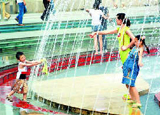
A red hot alarm was sounded yesterday for the second time in Shanghai this summer, as the temperatures topped 36 degrees Celsius.
The scorching heat has increased demand for power and tap water, boosted sales of air-conditioners, and sent many seniors and children to hospital. But the heat didn't create any major problems with the city's power grid, mainly because most factories and offices were closed for the weekend.
The red hot alert is sounded when temperatures are between 35 and 38 degrees. Meteorologists issued the warning at about 8am yesterday, and the mercury eventually rose to 36.1 degrees. On Saturday, the daily high was 35.9 degrees and the red hot alert was in effect for 12 hours.
At least one elderly man suffered heatstroke on a tour bus on Saturday, but he was treated by police and other passengers on board. The air-conditioning system and automatic doors on the bus broke down as it was traveling along Hongshan Road, locking more than 60 passengers in the vehicle. The elderly man fainted due to the extreme heat. Several passengers performed first aid while others called police. The elderly man regained consciousness 10 minutes later.
The city's power grid load peaked at 13.29 million kilowatts on Saturday. But it could hit 15 million kw today, when office buildings and factories reopen.
The city is expecting a supply shortfall of around 2.5 million kw if temperatures remain above 35 degrees for several days in a row.
The tap water supply reached 6 million tons on Saturday, a noticeable increase from usual, according to the city's water-supply control center.
However, demand didn't threaten the total tap water supply capacity, officials said. They estimated a consumption peak after the plum rains season concluded.
With the mercury rising in the city, local hospitals' emergency rooms also faced an unusually busy weekend, as many elderly people suffered from cardiac problems and children complained of diarrhea.
"We received about 300 patients a day, but the number jumped to over 400 these two days," said a doctor at Renji Hospital's emergency department yesterday.
"Most are elderly people with a cold, fever or cardiac syndromes and migrant workers, who may work and live in poor conditions."
The number of people suffering high fever reportedly increased 80 percent from usual at Zhongshan Hospital. Doctors said that is the result of people spend too much time in overly air-conditioned rooms.
Despite doctors suggesting moderate use of air-conditioners, sales of the appliance were booming at local household appliances stores.
At several outlets of Gome Electric Appliance Co, sales of air-conditioners over the weekend tripled from a week earlier. The company's 30 installation teams have been working from 5am to midnight.
(Shanghai Daily June 27, 2005)
|

